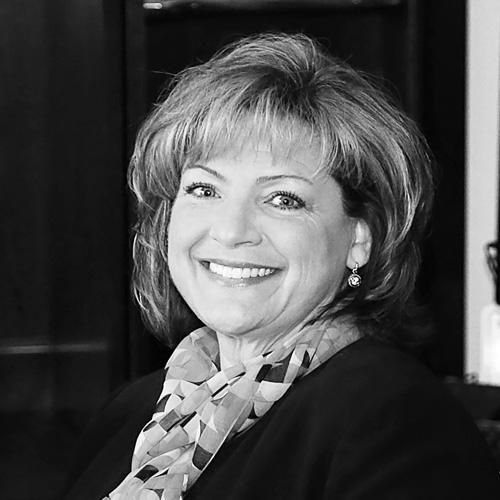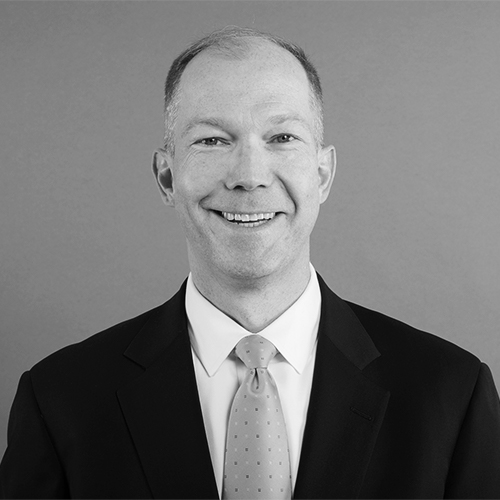When Amy Marquardt, VP and general counsel for Hospital Sisters Health System (HSHS), was hired at the Catholic
healthcare company in 2012, the former nurse and attorney took over a legal department that was still in its developmental stages. Since then, she has helped HSHS—a multi-institutional system comprised of fourteen hospitals, multiple community-based health centers, and an integrated physician network across Illinois and Wisconsin—grow the department to be a leader in its field.
What led you to working for HSHS?
Amy Marquardt: I ended up here because the health system that I had worked for for most of my career—both as a nurse and as an attorney—went through a restructuring, so my position as general counsel for Columbia Saint Mary’s healthcare system was eliminated. It created an opportunity in my life to step back and look at what I really wanted to do for the rest of my career.
I was fortunate to be offered an opportunity to work at HSHS for a couple of reasons. One, I really enjoy working in Catholic healthcare. I’ve been in Catholic healthcare my entire career, both as a nurse and as a lawyer. Working in Catholic healthcare has both a spiritual and a career aspect. It’s really a vocation. I find it particularly satisfying and enriching to serve in an organization that is mission-focused and keeps that mission at the center of all decision-making, which means that we keep the patient at the center of everything we do.
In addition to our focus on mission, this opportunity gave me a chance to challenge myself in new ways, become part of a system-level leadership team, and create a system-level legal function for HSHS. This struck me as an opportunity I couldn’t pass up, even though it meant relocating my family. While not easy, I was fortunate to have the support of my family in making this decision.
“What we have to do as a team is be completely commited to open and honest communication.”
Upon taking the job at HSHS, what was the shape of the legal department?
Marquardt: When I got here, one of the realizations I had was that this was going to be a little more challenging than I thought. While they’d had general counsel for HSHS for many years, it primarily had been served through outside counsel.
They had never had healthcare counsel in-house at the system level, and that means there were no processes or systems in terms of how things would work with an in-house function.
The other realization was that my team was completely decentralized, so there were no attorneys at the system level, but everybody out in the field, which brought with it some additional challenges because up to that point in my career, my team had been organized locally with everybody in the same office suite as me.
What sort of opportunities did that setup offer?
Marquardt: First, how would I begin to assimilate a general counsel into the system office, in terms of working relationships—including with the senior team because they had never had a general counsel sitting with it. And second, what did I bring to that team, what could I offer, and how could I be helpful in that relationship?
My initial thought was really to evaluate the model for HSHS. That process entailed going out to the local health ministries and meeting with leadership, and assessing how it was working and how we could continue to make it work. Or, whether I should really consider centralizing it, which I would say is a much more common model—not only in healthcare, but also in industry.
After doing this assessment, I realized that this decentralized approach was well accepted and desirous, but I needed to figure out how to operationalize it into a system-based HSHS office of the general counsel.
You made the decision to operate as a so-called “virtual law office.” Can you explain how it works?
Marquardt: What I was asked to do when I arrived here was to create a system function that served the needs of the entire system. HSHS organizes itself into divisions—Southern Illinois Division, Central Illinois Division, and then an Eastern Wisconsin Division and Western Wisconsin Division. For the purposes of the legal function, I also have what I call a Physician Division, which encompasses a large multispecialty group called HSHS Medical Group and the Prairie Cardiovascular Consultants, Ltd., a practice focused on cardiovascular issues.
In each of these divisions, I have an associate general counsel, and underneath those five is a team made up of either attorneys, paralegals, or contract specialists. The mix varies from location to location based on size of operations, among other factors.
I call it a virtual law office because one thing that was very evident to me when I first got here was a need to make sure that my team understood that we were going to be an HSHS office of general counsel. What I wanted to avoid was a client mindset that said, “My client is Central Illinois Division,” etc. The client is HSHS as a whole, and we just happen to have people located out in the field to help facilitate the legal needs of the various divisions.
That was really important because if the mindset isn’t where it needs to be, I would end up with attorneys who are loyal to their division and not really looking at the whole picture for HSHS in terms of strategy and direction, which could result in conflict, fragmentation, and inefficiency.
Could you talk about your philosophy on why a decentralized system works in your environment?
Marquardt: I think that it requires the right team and the right philosophy, and I’ve been fortunate to be blessed with a team that shares a common philosophy, which has led to great things for HSHS—including reduced costs in terms of overall legal spend and great customer satisfaction with the work that is delivered. What we have to do as a team is be completely committed to open and honest communication. So, when there are problems or issues, I want people to feel comfortable coming to me, discussing them openly, and know that we can have those conversations and problem-solve, and they don’t have to be concerned that somehow raising that will be viewed as a negative on their part.
In the reverse, I need to be comfortable and open to feedback they have for me. I truly value the input that I have received from this team in my time here—input from them has led to our success as well. It may sound cliché, but we believe in each other, and we believe in the team as a whole.
It’s the flow of communication between us, fully open and transparent. I try to share as much as I can—strategy things that we’re doing here at the system that might impact them—and then they try to do that for me in the reverse so that I can make sure I know what’s going on locally. This leads to shared understandings and ultimately greater satisfaction for us as a team and for the people we serve at HSHS.
How does the team communicate and find success in workflow?
Marquardt: We have informal communication, which is just picking up the phone anytime, and then formal meetings, where we interact with one another as a team. This whole virtual idea—the only way it really works is that we know each other as people. When you’re creating a team, people naturally bond more easily when they see people on a day-to-day basis, so we had to overcome that. In some form, I meet with this team or parts of it every week to encourage dialogue and sharing.
In addition, we have a limited number of in-person meetings. Once a year, we’ll meet in person as a whole team, and then once a year as a leadership team—the associate general counsels and myself. And what we do at both meetings is really look at how we are doing, what’s working, what isn’t, and what our goals should be going forward.
It’s really shared accountability. We all understand that we are working as a team, albeit virtual, that is responsible for delivering high-quality legal services to all of HSHS. Finally, I would be remiss if I didn’t give a tremendous amount of credit to the contract specialist at the HSHS system office who keeps all of these many moving parts coordinated.
I understand that there was a personal experience that led you to healthcare. Can you talk about what that was and how it affected you moving forward?
Marquardt: I was a freshman in high school, and my aunt had been ill for a long period of time. I have this recollection of spending some time in the hospital, waiting to see her, and just sort of being influenced by that whole episode of illness and her experiences in the hospital and realizing the significance of a healthcare environment. Unfortunately, she passed away shortly thereafter, but I think it left an impression on me as to just how important healthcare is to people in their daily lives and what a difference it can make—regardless of whether an illness is curable or not. It’s the compassionate nature of people that work in healthcare that makes it a great environment to work in. AHL


